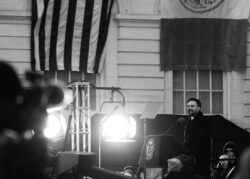It snowed a hell of a lot this week. Amid the record-breaking snowfalls, school closings, and panicking weathermen came the unfortunate but predictable conservative reaction that this kind of anomalous blizzard somehow debunks the theory of “global warming.” The argument—that rare instances of severe cold prove that temperatures are not in fact trending upwards over the long term—is seemingly raised after every dramatic winter storm.
This argument is, of course, an appeal to ignorance. No one notices the increase of a couple degrees in average annual temperature over a twenty-year span, but they certainly can see that global warming doesn’t seem to be happening now, at this very instant, in the middle of a blizzard.
Before I continue I should clarify: I don’t really “believe in” climate change, per se—if you called me a “global warming skeptic” I probably wouldn’t correct you. With that said, I never had any problem with the societal effects of what I lovingly dubbed “climate change hysteria.” As someone who cares deeply for the environment, I think anything that makes my fellow Americans more environmentally conscious is a good thing, even if most people only live a “greener” lifestyle because it’s trendy among the progressive, upper middle-class.
But right now I’m watching the things I hold dear in my conflicted existence fall apart from both ends. As much as I’ve loved the individual decisions to be more environmentally aware, the libertarian in me thinks that, outside of basic litter and pollution laws, it’s not really up to the state to pass life-changing laws based upon data that I and many others are still not completely sold on.
Despite that, I don’t want global warming to be false. Obviously it would be a relief to know that we aren’t going to accidentally end the world due to shortsighted behavior. I would, of course, feel a certain amount of vindication knowing that I was correct to not jump on the bandwagon so quickly, but if the theory were debunked, we would be back to where we were before An Inconvenient Truth came out. People would stop concerning themselves with the environment, causing other adverse environmental impacts (albeit non-apocalyptic ones).
But I am afraid that’s happening already, as popular belief in anthropogenic climate change is dropping at a remarkable rate. In just the three months since their last survey, British polling group Populus is reporting a 15 percent drop in those who believe in man-made global warming, now down to just 26 percent of Britons. To be fair, these aren’t American figures (and despite the United Kingdom’s reputation as a liberal haven, none of the towns I’ve been to in the British Isles have nearly as many recycling receptacles as their counterparts on the Eastern Seaboard do), but this newly-released poll shows a drop that is likely mirrored in America and will probably lead to a return to our nation’s former ways.
Granted, this new poll could be a reflection of the impact of the “climategate” scandal, but I can’t help but think that the decrease in popular support for the global warming theory is correlated with more serious measures being brought to the table. In the same way Massachusetts (Massachusetts!) bailed on healthcare reform, just as it was starting to get serious, people are finding global warming a less enticing notion as they realize how imposing the policy solutions would be. It seems as though the libertarian and the environmentalist in the average American can’t be happy at the same time.
We had a bit of a respite, though, during the Super Bowl, of all places. Sandwiched between crude advertisements for cheap beer and inscrutable Tim Tebow brand reinforcement was an eyebrow-raising Audi spot. Centered on the idea of an overscrupulous “green police,” the ad for the A3 TDI seems to mock hardcore environmental sorts, despite the fact that it’s selling a product pitched as the “Green Car of the Year.” That someone out there thinks there’s a market for this ad—that more people than me want to treat the environment right but would prefer to do so on their own terms—shows that perhaps, in the most American of ways, we will do what’s best simply because we want to. I sure as hell hope so.




